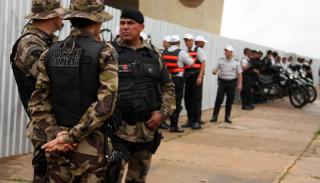
Breadcrumbs navigation
Crossed pandemics: Racism, police violence, and Covid-19 in Brazil and the United States
In this short summary video, author Marta Fernández discusses the key points from her Review of International Studies (RIS) article jointly authored with Pedro Paulo dos Santos Silva - Crossed pandemics: Racism, police violence, and Covid-19 in Brazil and the United States.
The article aims to answer the following question: how is it possible that in the context of the Covid-19 pandemic, as a series of daily activities were suspended in the name of preserving life, police violence has not only continued but worsened in the United States and in Brazil?
Want to know more? You can read the full article at DOI: https://doi.org/10.1017/S0260210523000219
BISA members receive access to all articles in RIS (and our other journal European Journal of International Security) as a benefit of membership. To gain access log in to your BISA account and scroll down to the 'Membership benefits' section. If you're not yet a member join today.
Abstract
The article aims to answer the following question: how is it possible that in the context of the Covid-19 pandemic, as a series of daily activities were suspended in the name of preserving life, police violence has not only continued but worsened in the United States and in Brazil? We argue that racism structures social relations both in the United States and in Brazil, functioning as an essential activity of states that remain involved in the production of different types of physical and symbolic death even amidst the Covid-19 pandemic. Contrary to mainstream International Relations, which narrates its central categories – such as the state – as neutral and non-racialised, we will draw attention to the racial origin of the state and its institutions, such as the police. This article aims to look at these two contexts, Brazil and the United States, in a crossed way. This analysis is only possible because, despite the heterogeneity of the two scenarios, we understand that racism is constitutive of global order and of the institutions that sustain its unfair and unequal character.
Image by André Gustavo Stumpf licensed under the Creative Commons Attribution 2.0 Generic license.